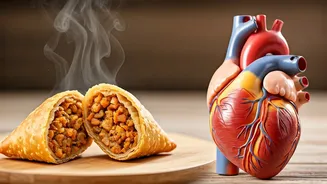Samosa's Hidden Cost
A cardiologist has recently raised a red flag regarding the consumption of a seemingly harmless snack: the humble samosa, often available for as little
as ₹20. While the price tag is enticing, the health implications may be far more significant. The cardiologist's warning serves as a reminder that the seemingly small choices we make regarding our diet can have profound impacts on our cardiovascular health. This warning specifically relates to how frequently people eat these snacks without considering their nutritional impact, especially the high fat content and refined carbohydrates commonly used in their preparation. These factors may increase the risk of heart-related ailments.
Unhealthy Ingredients Revealed
The cardiologist's concerns stem from the ingredients typically found in a samosa. The deep-frying process, a common method of preparing this snack, introduces a large amount of unhealthy fats. These fats, coupled with the refined carbohydrates often used in the samosa's dough, can contribute to elevated cholesterol levels and blood sugar spikes. These fluctuations can increase the strain on the heart, potentially leading to long-term issues. Furthermore, the filling, often consisting of potatoes and peas, can lack essential nutrients and fiber, which are vital for a balanced diet and optimal heart health. Regular consumption of foods high in such unhealthy elements can make one more susceptible to cardiovascular diseases.
Risks of Frequent Consumption
Consistent intake of samosas, particularly those prepared with unhealthy ingredients, can significantly elevate the risk of heart disease. The high fat content can lead to the buildup of plaque in the arteries, a condition known as atherosclerosis. This buildup narrows the arteries, restricting blood flow and increasing the risk of heart attacks and strokes. Similarly, frequent consumption of refined carbohydrates can lead to insulin resistance, a precursor to type 2 diabetes, which further damages the cardiovascular system. The cardiologist emphasizes the importance of understanding these risks and making conscious dietary choices to mitigate them. Considering the widespread consumption and easy accessibility of samosas, the health risks are more prevalent.
Heart-Healthy Alternatives Explored
While enjoying an occasional samosa might not be detrimental, the cardiologist suggests exploring healthier alternatives. Choosing baked or air-fried versions of samosas can drastically reduce the amount of unhealthy fats. Alternatively, one could prepare samosas at home, controlling the ingredients used and opting for healthier cooking methods. Increasing the portion of vegetables in the filling can add crucial fiber and nutrients. Another option is to consider healthier snacks that offer similar flavors and textures, like vegetable-filled spring rolls or whole-grain crackers with dips rich in protein. Emphasizing a diet rich in fruits, vegetables, and lean proteins is also essential for maintaining cardiovascular health, complementing the reduction of unhealthy foods.
Prioritizing Heart Wellness
The cardiologist's warning serves as a timely reminder of the importance of prioritizing heart health through mindful eating. It is crucial to be aware of the ingredients and preparation methods of the foods we consume regularly. Reading food labels and making informed choices is a vital first step. Regular exercise, managing stress, and getting adequate sleep also play crucial roles in safeguarding cardiovascular health. By adopting a holistic approach, individuals can reduce their risk of heart disease and improve their overall well-being. Ultimately, understanding the hidden costs of seemingly harmless foods like the samosa empowers individuals to make better choices and protect their heart health for the long term. Consulting a healthcare professional for personalized dietary advice is recommended.












